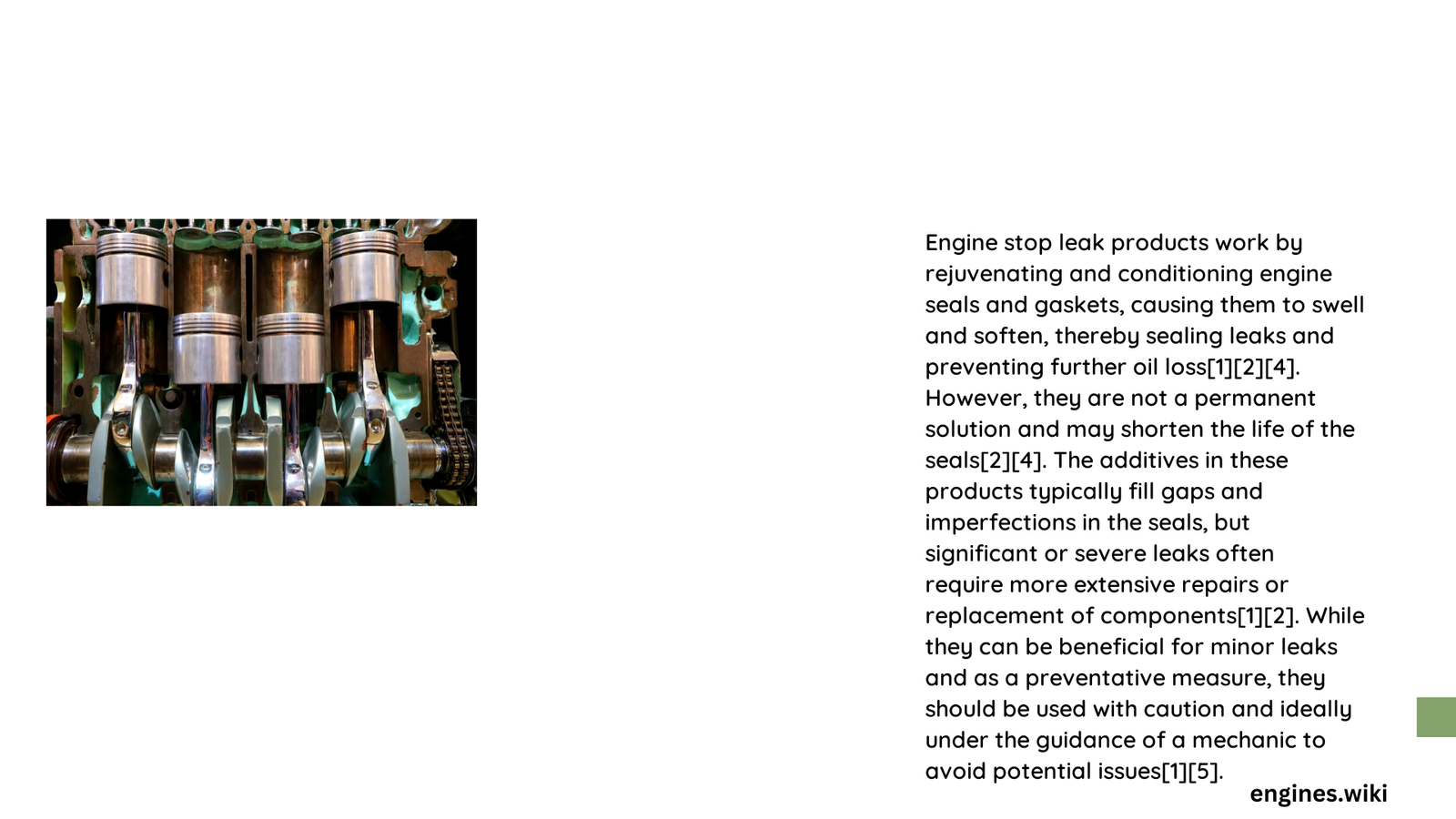Engine stop leak products have become a popular solution for vehicle owners facing minor leaks, offering a potentially cost-effective alternative to expensive mechanical repairs. These specialized chemical formulations promise to seal small leaks in engine components by conditioning and restoring worn seals, potentially saving car owners significant repair costs. However, their effectiveness varies depending on the type and severity of the leak, making it crucial to understand their capabilities and limitations before application.
What Are Engine Stop Leak Products?
Engine stop leak products are chemical additives designed to seal minor leaks in automotive engines by conditioning and restoring seals and gaskets. These products work through specialized chemical formulations that target specific types of leaks, such as:
- Oil seal leaks
- Coolant system leaks
- Head gasket micro-cracks
- Valve seal deterioration
How Do Stop Leak Products Function?
| Product Type | Mechanism | Effectiveness Range |
|---|---|---|
| Chemical Sealants | Condition and expand seals | Mild to Moderate Leaks |
| Particle-Based Solutions | Fill microscopic gaps | Small, Localized Leaks |
| Rubber Rejuvenators | Restore seal elasticity | Aged Seal Restoration |
Can Stop Leak Products Resolve Different Leak Types?

Oil Leak Scenarios
Stop leak products demonstrate varying success rates for different oil leak scenarios:
- Valve Cover Gasket Leaks
- Success Rate: 60-75%
- Best for minor, surface-level leaks
-
Least effective for major structural damage
-
Rear Main Seal Leaks
- Success Rate: 40-50%
- More challenging to address
- Recommended as a temporary solution
Coolant System Leak Evaluation
Top-performing products like Bar’s Leaks and Lucas Engine Oil Stop Leak offer targeted solutions:
- Bar’s Leaks HG-1: Specifically designed for head gasket repairs
- Lucas Engine Oil Stop Leak: Versatile formula for multiple leak types
What Factors Influence Product Effectiveness?
Several critical factors determine the success of engine stop leak products:
- Leak Severity: Minor leaks respond better than extensive damage
- Engine Age: Newer engines show higher repair success rates
- Product Quality: Professional-grade formulations offer superior performance
- Proper Application: Following manufacturer instructions is crucial
Recommended Application Strategies
Best Practices for Using Stop Leak Products
- Diagnose the exact leak location
- Choose a product matching your specific leak type
- Clean the engine system before application
- Use precise product-to-oil ratio
- Monitor engine performance post-application
Cost Comparison: Stop Leak vs. Mechanical Repair
| Repair Method | Average Cost | Time Required |
|---|---|---|
| Stop Leak Product | $10 – $30 | 30-60 minutes |
| Professional Mechanical Repair | $500 – $2,000 | 1-3 days |
Limitations and Potential Risks
While stop leak products offer benefits, they are not universal solutions:
- Not Suitable for:
- Severe structural damage
- Complete seal/gasket failure
- High-mileage engines with extensive wear
Expert Recommendations
Automotive professionals suggest:
– Use stop leak products as a temporary solution
– Address underlying mechanical issues
– Combine with regular maintenance
– Consult a mechanic for persistent leaks
Final Verdict: Do Engine Stop Leak Products Work?
Engine stop leak products can be effective for minor leaks when:
– Applied correctly
– Matched to specific leak type
– Used as a short-term solution
– Complemented by proper vehicle maintenance
Caution: Not a permanent fix for significant engine damage
